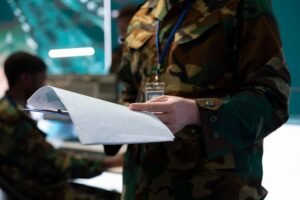Warfare names have played a significant role throughout history as they not only serve as identifiers for various conflicts but also carry underlying meanings and symbolism. From ancient battles to modern warfare, the names given to military operations, campaigns, and strategies have often reflected the goals, strategies, and context of the combat. In this comprehensive guide, we will delve into the world of warfare names, exploring their benefits, usage, best practices, and frequently asked questions.
Introduction
Warfare names, also known as operation code names or battle names, are designated titles given to military operations, battles, and strategic maneuvers. These names can range from simple alphanumeric codes to elaborate phrases that convey a specific theme or message. The use of warfare names serves several purposes, including operational security, communication clarity, and historical documentation.
Throughout history, warfare names have been used by various military forces to plan, execute, and analyze military operations. These names can provide insights into the strategic objectives, geographical locations, or timeline of a particular conflict. Additionally, they can evoke emotions, instill a sense of purpose, or convey a sense of unity among troops and allies.
Benefits of Warfare Names

How It Helps in Military Operations
Warfare names serve as essential tools in military operations by providing a consistent and clear way to reference specific actions or plans. By assigning a unique name to an operation, commanders and troops can easily communicate and coordinate their efforts without confusion. This is especially crucial in complex and dynamic combat environments where precise communication is paramount.
Furthermore, warfare names can help in maintaining operational security by concealing sensitive information from adversaries. By using coded or cryptic names, military forces can prevent unauthorized disclosure of critical details related to their plans and intentions. This enhances the element of surprise and reduces the risk of interception or sabotage.
Key Advantages for Military Personnel and Strategists

For military personnel and strategists, warfare names offer a powerful tool for analysis, evaluation, and historical documentation. By studying the names of past military operations, researchers can gain insights into the underlying strategies, tactical approaches, and decision-making processes of military leaders. This allows for a deeper understanding of warfare dynamics and lessons learned from previous conflicts.
Moreover, warfare names can foster a sense of camaraderie and esprit de corps among troops by creating a shared identity and sense of purpose. When soldiers identify with the name of their operation, they may feel a stronger motivation to accomplish their mission and support their comrades. This psychological aspect of warfare names can enhance morale, cohesion, and effectiveness on the battlefield.
How to Use/Apply Warfare Names

Step-by-Step Guide
- Assign a Theme or Concept: When creating a warfare name, consider the strategic objectives, geographic locations, or historical context of the operation. Choose a theme or concept that aligns with the mission’s goals and resonates with the troops.
- Ensure Clarity and Uniqueness: Select a name that is easy to pronounce, remember, and differentiate from other operations. Avoid generic or ambiguous terms that may cause confusion or overlap with existing names.
- Communicate Effectively: Share the warfare name with all relevant personnel, including commanders, staff officers, and field units. Use the name consistently in briefings, orders, and reports to ensure clear and accurate communication.
- Maintain Operational Security: Be mindful of operational security considerations when using warfare names. Avoid revealing sensitive information or operational details that could compromise the mission’s success.
Common Mistakes to Avoid
![]()
Inappropriate or Offensive Names: Avoid using names that are disrespectful, derogatory, or culturally insensitive. Be mindful of the potential implications and interpretations of the chosen name.
Lack of Coordination: Ensure that all units and personnel involved in the operation are aware of the warfare name and understand its significance. Lack of communication or coordination can lead to confusion and misinterpretation.
Best Practices for Warfare Names

Tips & Tricks for Better Results
Consider Local Culture and Language:** When operating in foreign regions, take into account the cultural sensitivities and linguistic nuances of the local population. Choose a warfare name that is respectful and meaningful in the context of the operational environment.
Align with Strategic Objectives:Ensure that the warfare name reflects the strategic goals, objectives, and desired outcomes of the operation. A well-chosen name can convey a sense of purpose and unity among participants.
Expert Recommendations
According to military historians and strategists, the best warfare names are those that strike a balance between creativity, relevance, and operational security. By incorporating historical references, geographical landmarks, or strategic themes into the name, commanders can imbue the operation with a sense of legacy and significance.
FAQs About Warfare Names
Q: Can warfare names be changed during an operation?
A: Yes, warfare names can be modified or updated based on evolving circumstances, shifts in strategy, or changes in leadership. However, such changes should be communicated clearly and promptly to all relevant parties to avoid confusion.
Q: How are warfare names chosen?
A: Warfare names are typically selected by military commanders, staff officers, or designated planners based on the operational context, objectives, and theme of the mission. Factors such as security considerations, cultural sensitivities, and historical symbolism may also influence the choice of a warfare name.
Q: What is the significance of using alphanumeric codes for warfare names?
A: Alphanumeric codes are often used for sensitive or classified operations to enhance operational security and confidentiality. By assigning a coded designation to an operation, military forces can limit the exposure of critical information and minimize the risk of unauthorized disclosure.
Conclusion
In conclusion, warfare names play a vital role in military operations by providing clarity, coordination, and historical significance. By carefully selecting and using warfare names that align with strategic goals, operational needs, and cultural sensitivities, military leaders can enhance communication, morale, and operational effectiveness. As a fundamental aspect of military tradition and practice, warfare names continue to shape the narrative of conflict and unity on the battlefield. Embrace the power of a well-chosen name, and let it inspire and guide your forces to victory.
Whether you are a military strategist, history enthusiast, or curious reader, the world of warfare names offers a fascinating glimpse into the art and science of military operations. By understanding the benefits, best practices, and nuances of warfare names, you can appreciate the significance and symbolism behind these iconic identifiers of conflict and courage. Explore the rich tapestry of warfare names, and discover the stories of valor, sacrifice, and resilience that they encapsulate.


